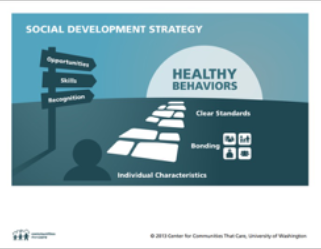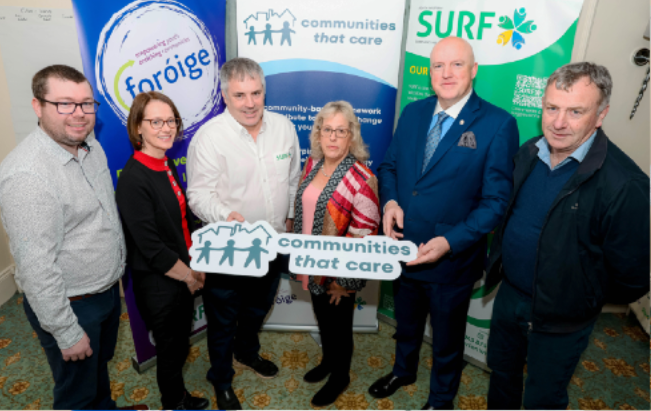Dillon, Lucy (2025) Communities That Care in Ireland. Drugnet Ireland, Issue 91, Spring 2025, pp. 32-34.
| Preview | Title | Contact |
|---|---|---|
|
PDF (Drugnet Ireland 91)
1MB |
Communities That Care in Ireland
Communities That Care (CTC) is a place-based initiative that develops a prevention operating system in a community in order to prevent drug use and other harmful behaviours.1 It provides a method for communities to assess the needs of their young people, coordinate stakeholders to develop a response, select and implement suitable evidence-based programmes to meet these needs, and evaluate the outcomes achieved. CTC is being implemented in Ireland for the first time in 2025. It is being led by the South Western Regional Drug & Alcohol Task Force’s Substance Use Regional Forum (SURF), with support from the Department of Health, the Department of Justice, and Kildare County Council.
Background to CTC
Community mobilisation/community coalitions
CTC was developed in the 1980s in the United States of America (USA) by J David Hawkins and Richard F Catalano. Since then, it has been implemented in sites across the USA, and more recently in Europe – in Germany, Croatia, and the Netherlands. At the core of CTC is the strategic approach of ‘community mobilisation’ or ‘community coalitions’. Broadly speaking, this refers to a process through which members of communities work together to take action and bring about change, collaborating with a range of stakeholders from the public, statutory, and private sectors to identify the changes they want to bring about in their area. Based on the best evidence available, the different stakeholders work together to plan how to bring about the desired changes. They then implement the plan and monitor its progress in reducing the target behaviours.2
Social Development Strategy
Underpinning the CTC model is the Social Development Strategy. This is an approach to working with young people that puts the evidence of what works effectively to prevent them from developing health and behavioural problems into a strategy that can be implemented in families, schools, and communities. This approach is not unique to CTC, however, and reflects the way in which a lot of work with young people is carried out more broadly. Under the Social Development Strategy, a young person is provided with opportunities for active participation and meaningful interaction with others and the skills necessary to succeed in this participation. This is followed by recognition for their efforts and achievements. Consequently, this young person will feel more bonded to their environment and the other people within it; for example, within the family, school, or community. Strong bonds motivate young people to adopt the healthy standards of the person or group to which they are bonded. For more information go to the following link: The Science Behind the Programs | The Center for Communities That Care.3
Phases of CTC
In 2024, the Health Research Board (HRB) published Integrative review on place-based and other geographically defined responses to drug-related threats in communities, the aim of which was to provide a summary of the international evidence on place-based initiatives in the context of drug-related harms.4 CTC is one of the initiatives that was covered by the review. In CTC, a community coalition of stakeholders promotes the use of effective interventions for preventing problem behaviours among young people, based on evidence of the risk and protective factors specific to young people in that community. While Pratschke et al. note that CTC coalitions in different locations may have different structures and leadership, they also identify five phases that are common to the initiative across different sites: mobilisation of community leaders; creation of a prevention/community board; identification of risk and protective factors for young people in the community through a survey; selection of evidence-based prevention programmes to meet the needs identified; and evaluation of effectiveness.

Communities That Care (CTC) is a prevention system that activates a coalition of stakeholders to develop and implement a science-based approach to prevention in the community to achieve collective impact on youth development community wide. The CTC prevention system seeks to achieve this goal by increasing the use of tested, effective preventive interventions that address risk factors for adolescent problem behaviours prioritized by the community. This is expected to produce community-wide reductions in targeted risk factors and, in turn, decreased adolescent substance use, delinquency, and violence. (Hawkins et al. 2014, p. 123) cited in Pratschke et al. p. 404
Challenges faced
As with all initiatives, CTC faces challenges in implementation. A review examined by Pratschke et al. provides a useful summary of the challenges faced by CTC communities:
Community-based models typically rely on local coalitions to coordinate the implementation of multiple prevention strategies across agencies, and it can be very difficult to engage and ensure collaboration among diverse stakeholders who may have different skills, needs, resources, and ideas about what is needed ... In addition, ensuring the adoption and high-quality implementation of a single prevention strategy is difficult, and problems are likely to be multiplied when implementing several programs across a variety of settings ... Furthermore, enacting multiple programs and delivering them at a scale large enough and long enough to produce community-wide changes is likely to require significant human and financial resources, as well as long-term investments ... securing funds can be challenging, particularly if benefits may not be seen for many years. Kuklinski et al. (2015) (p. 166) cited in Pratschke et al. p. 424
CTC in Ireland
The implementation of CTC has now begun in Ireland for the first time and is based in the community of Newbridge, Co Kildare. It is expected that this initial cycle of CTC, including its five phases, will run from January 2025 until the end of 2026. Darren Shanahan is the CTC Coordinator and he is carrying out this role alongside his work in the Foróige Drug Prevention & Education Initiative. CTC will build on existing structures, resources, and services in the community.
On 26 February 2025, a CTC key leader orientation meeting was held with representatives from Tusla, SURF, An Garda Síochána, local representatives, Kildare County Council, Kildare’s Children and Young People’s Services Committee, Kildare and Wicklow Education and Training Board, Youthreach, Foróige, Safer Newbridge, Family Resource Centre, and local schools. It was delivered with the support of the Director of Training and Family Programs, Center for Communities That Care, based in the USA. It is expected that CTC in the Newbridge area will continue to expand and engage with more local services, with the aim of achieving the best outcomes possible for young people in the community.

Darren Shanahan CtC Coordinator with Drug Prevention Education Initiative, Emma Berney, Coordinator Kildare CYPSC, Steven Joyce, SURF, Dalene Beaulieu, University of Washington, CTC Specialist, Senator Aubrey McCarty, SURF, Chairperson, Pat Leogue, SWRDATF clg
1 European Monitoring Centre for Drugs and Drug Addiction (EMCDDA) (2017) Communities That Care (CTC): a comprehensive prevention approach for communities. EMCDDA Papers. Luxembourg: Publications Office of the European Union. Available from: http://www.drugsandalcohol.ie/26931/
2 Dillon L (2017) Communities That Care: a review. Drugnet Ireland, Issue 62 (Summer): 21. Available from: https://www.drugsandalcohol.ie/27745/
3 The Science Behind the Programs | The Center for Communities That Care. https://www.communitiesthatcare.net/prevention-science/
4 Pratschke J, Glanville J and Kelly P (2024) Integrative review on place-based and other geographically defined responses to drug-related threats in communities. HRB Drug and Alcohol Evidence Review 9. Dublin: Health Research Board. Available from: https://www.drugsandalcohol.ie/40846/
J Health care, prevention, harm reduction and treatment > Harm reduction > Substance use harm reduction
L Social psychology and related concepts > Participation / involvement / engagement / co-production
MA-ML Social science, culture and community > Community action > Community development
MA-ML Social science, culture and community > Community action > Community involvement
VA Geographic area > Europe > Ireland
Repository Staff Only: item control page